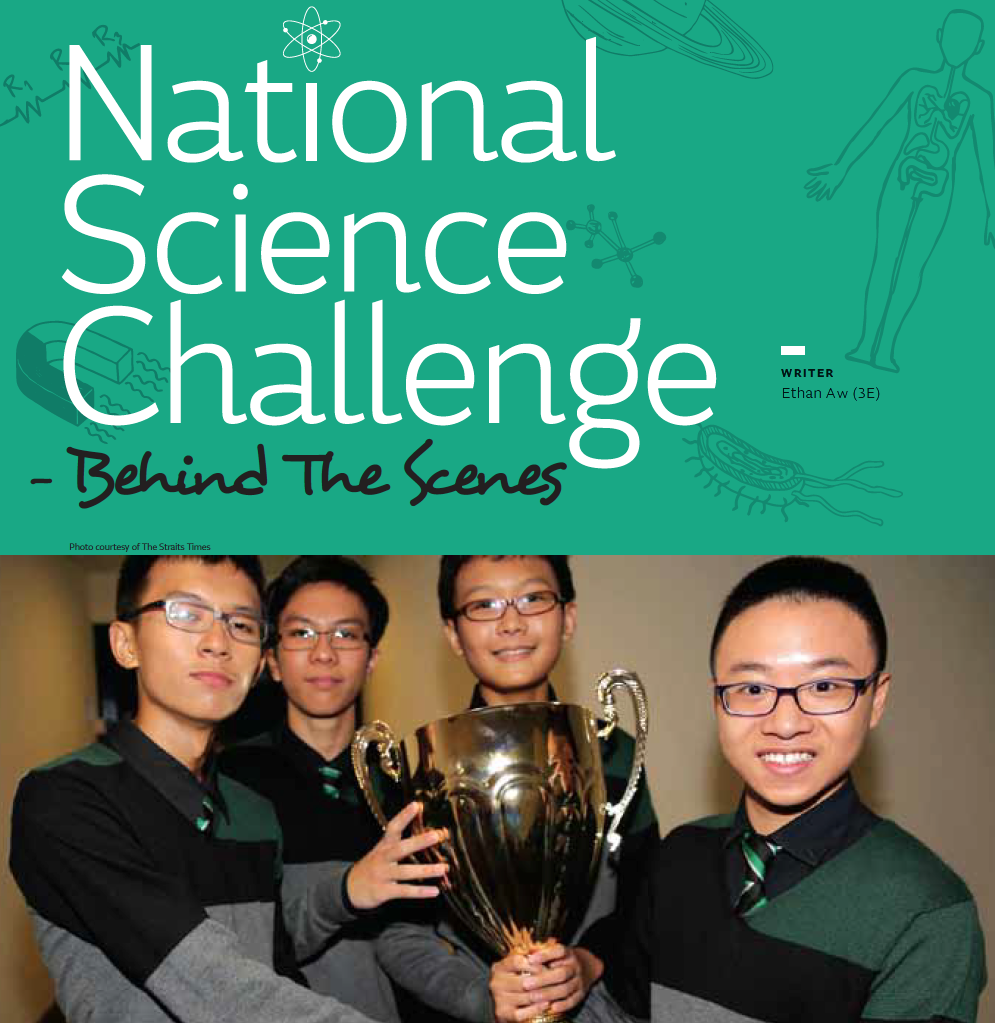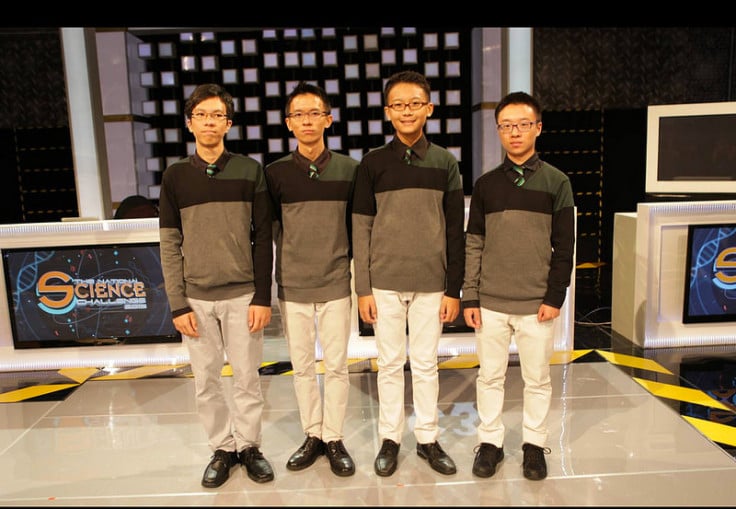by Ethan Aw (3E)

‘THE CHAMPIONS OF THE NATIONAL SCIENCE CHALLENGE 2015! WHO ARE THEY?’ ‘RAFFLES INSTITUTION!’
It was a proud day for the RI team and spectators at Mediacorp’s Caldecott Broadcast Centre. Team Raffles had once again clinched the championship after many trying weeks vying for the trophy.
Having won this competition in question a total of 7 times since 2004 and defending a running streak of 3 wins in a row, this victory may seem like nothing new to the Raffles student. But what few people actually know is: How do they do it? How do the Year 3 whiz kids manage to produce top-notch results in the National Science Challenge every year?
The National Science Challenge (NSC) is an annual televised production, featuring competitors from 16 different schools engaging in a battle of wits and scientific knowledge. Each round presents participants with four challenges, with this year’s including “What’s Your Hunch?” testing their theoretical knowledge on common phenomena, as well as the well-known “Rapid Response Round”. Last year, RI (Y1-4) sent a team of 4 members, Fong Khi Yung, Wei Shu Yang, Lim Hur, and Gavin Ng to take up the challenge. To understand more about the competition and the team’s preparation for it, Shu Yang (4E) tells us more.
‘Special’ Training?
Many would think that in order to sufficiently prepare for the diverse and high-level questions posed in the NSC, the team would need to have specialised and expert mentors to aid them accumulate the necessary scientific skills and knowledge. This is not the case however, as Shu Yang states, ‘The four of us just trained together with the help and guidance of our seniors, the former participants and winners of the NSC. Our batchmate Windsor Koh also helped us by sharing his ideas during our training sessions.’
Besides memorising scientific knowledge and concepts individually, the team simply convened to share ideas and conduct discussions to bolster their scientific understanding, and certainly did not need to enlist the help of professional coaches to aid them in training.
‘The Science Club teachers mostly allowed us to do our own training, and were present just to provide opinions when we asked and make sure we didn’t set anything in the lab on fire.’
The team and their seniors adopted a variety of methods to improve their span of knowledge, attempting quizzes both self-constructed and taken from the Internet, and competing with each other using buzzers to test how fast they could recall the scientific concepts. Notably, the team also attempted to emulate certain challenges commonly presented in the competition. ‘There was the challenge where we had to come up with a scientific solution to a real-life practical problem, so we tried to do something similar, for example, we made a barometer with simple materials (which actually worked!)’ All the while, their seniors and batchmate would aid by checking the team’s responses or solutions and providing comments for improvement, which Shu Yang believes were invaluable to the team’s success.

From L to R: Fong Khi Yung, Gavin Ng, Wei Shu Yang, Lim Hur. photograph from toggle.sg
The Team Challenge
Things got stressful and difficult when it came down to the competition itself, especially since they were on camera to be aired on television – but the team stayed determined, and faced the challenges as calmly as they could. ‘We just decided that we would try our best, and we would be happy with whatever result we would get. That was our final goal,’ says Shu Yang.
As much as the team was already equipped with extensive scientific knowledge, they were still faced with many questions that occasionally left them stumped. To overcome this, they had an emergency discussion plan to firstly brainstorm ideas as to which concepts should be involved in answering, decide on a direction towards which they should craft their answer, then work together to develop the idea before improvising a response out of the brief discussion.
‘It was very useful to brainstorm ideas together when we didn’t really know how to approach the question, because sometimes when you mention something it may jog another team member’s memory and allow him to recall the correct concept.’
The team found it useful to understand each other’s proficiencies in the sciences so they could more easily decide whose opinion to value greater when time did not permit for a lengthy discussion. Khi Yung and Lim Hur took Raffles Academy Physics, while Gavin and Shu Yang took Raffles Academy Biology, making them each specialists in their own respect. All four members took Raffles Academy Chemistry. Another integral part of the competition was their presentation skills, as two of the four challenges required them to conduct a short presentation on their derived science concepts to the audience, as well as speaking for the camera in general. Gavin and Shu Yang, who also happened to be debaters, could thus contribute greatly and speak fluently during the presentations, which definitely added merit to their performance in the NSC.
To the team, the greatest contributing factor to their eventual success in the NSC was the wide support from everyone that had helped them in one way or another, and the cheering of Rafflesian spectators below the stage. ‘It was their support that ultimately motivated us to really push ourselves and achieve what we did.’
‘They kept our colours flying.’
The Next Challenge
The next challenge for these prodigious four is not another competition, but preparing the next four challengers who will be making their debut in the upcoming NSC 2016. As seniors, Shu Yang’s team will be working closely with the new team, mentoring them with regards to the format of the competition and filling in the gaps in their content knowledge, as their seniors had done for them. He has full confidence that everyone, especially the participants, will rise to the challenge and do their utmost to gear up for the competition, so stay tuned to see how they perform in the 2016 National Science Challenge.